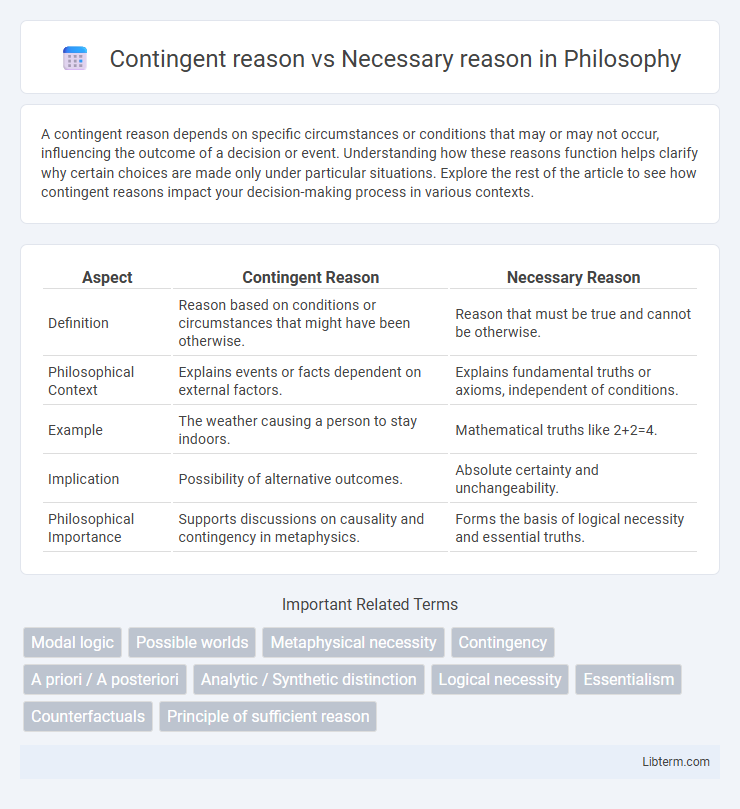A contingent reason depends on specific circumstances or conditions that may or may not occur, influencing the outcome of a decision or event. Understanding how these reasons function helps clarify why certain choices are made only under particular situations. Explore the rest of the article to see how contingent reasons impact your decision-making process in various contexts.
Table of Comparison
| Aspect | Contingent Reason | Necessary Reason |
|---|---|---|
| Definition | Reason based on conditions or circumstances that might have been otherwise. | Reason that must be true and cannot be otherwise. |
| Philosophical Context | Explains events or facts dependent on external factors. | Explains fundamental truths or axioms, independent of conditions. |
| Example | The weather causing a person to stay indoors. | Mathematical truths like 2+2=4. |
| Implication | Possibility of alternative outcomes. | Absolute certainty and unchangeability. |
| Philosophical Importance | Supports discussions on causality and contingency in metaphysics. | Forms the basis of logical necessity and essential truths. |
Understanding Contingent and Necessary Reasons
Contingent reasons depend on specific circumstances and can vary based on situational factors, making them conditional and non-absolute. Necessary reasons, by contrast, are universal and invariant, holding true regardless of context due to their inherent logical or causal authority. Understanding contingent and necessary reasons involves recognizing the difference between variability influenced by external factors and the unchanging nature of fundamental principles.
Defining Contingent Reasons
Contingent reasons are considerations that motivate action based on specific, variable circumstances rather than universal necessity, depending on particular desires, goals, or contexts. They differ from necessary reasons, which apply universally and unconditionally regardless of individual preferences or situations. Understanding contingent reasons involves recognizing that they guide decisions only when certain conditions or subjective factors are met, making them context-dependent and non-essential.
Defining Necessary Reasons
Necessary reasons are fundamental causes or conditions that must exist for a particular event or fact to occur, embodying essential truths that cannot be otherwise. These reasons are inherently tied to the nature of the subject and provide a logically binding explanation that excludes alternatives. In contrast to contingent reasons, which depend on variable circumstances, necessary reasons establish unchanging and universally applicable foundations for understanding reality.
Key Differences Between Contingent and Necessary Reasons
Contingent reasons depend on particular circumstances or conditions that may change, meaning their validity is not absolute and can vary with context. Necessary reasons, however, are universally valid and must hold true regardless of any specific situation, reflecting essential, unchanging truths. The key difference lies in contingency being conditional and situational, whereas necessity denotes invariability and logical necessity.
Philosophical Foundations of Contingency and Necessity
Contingent reasons depend on specific conditions or contexts, making their validity variable and tied to empirical facts, whereas necessary reasons hold universally and independently of particular situations. In the philosophical foundations of contingency and necessity, contingency reflects states or propositions that could be otherwise, contingent upon external factors, while necessity implies unalterable truths or causes bound by logical or metaphysical constraints. This distinction underpins modal logic and metaphysics, influencing debates on causality, existence, and the nature of truth.
Examples of Contingent Reasons in Daily Life
Contingent reasons in daily life often arise from situational factors, such as choosing to carry an umbrella because the weather forecast predicts rain or deciding to leave early to avoid traffic congestion. These reasons depend on specific conditions and can change, unlike necessary reasons, which are universal and unchangeable, like the need for oxygen to breathe. Recognizing contingent reasons helps in understanding decision-making processes influenced by external circumstances and evolving contexts.
Illustrations of Necessary Reasons in Logic
Necessary reasons in logic are conditions that must be present for a proposition to hold true, exemplified by mathematical proofs where axioms strictly determine outcomes. For instance, in geometry, the necessity of the sum of angles in a triangle equaling 180 degrees serves as a necessary reason, grounded in Euclidean postulates. These illustrations highlight how necessary reasons underpin logical deductions by ensuring validity and consistency across arguments.
Implications for Moral and Ethical Reasoning
Contingent reasons depend on specific desires or circumstances, influencing moral decisions by introducing variability and personal context into ethical judgments. Necessary reasons, grounded in universal principles or rationality, provide a stable foundation for moral obligations and ethical norms. The distinction impacts debates on moral objectivity, where necessary reasons support universal ethics while contingent reasons emphasize relativism and individual motivation.
Contingent vs Necessary Reasons in Decision-Making
Contingent reasons depend on specific conditions or circumstances that may change, influencing decision-making based on variable factors like personal preferences or situational context. Necessary reasons hold universal or logical necessity, providing decisive and stable grounds for actions, such as ethical principles or factual truths. Understanding the distinction between contingent and necessary reasons enhances rational decision-making by clarifying when choices rely on changeable factors versus immutable principles.
Conclusion: Evaluating the Importance of Each Reason Type
Contingent reasons depend on specific conditions and contexts, providing flexibility and adaptability in decision-making processes. Necessary reasons offer foundational justifications that remain valid regardless of circumstances, ensuring stability and consistency in conclusions. Evaluating the importance of each reason type reveals that contingent reasons drive practical actions while necessary reasons underpin logical coherence and universal validity.
Contingent reason Infographic

 libterm.com
libterm.com